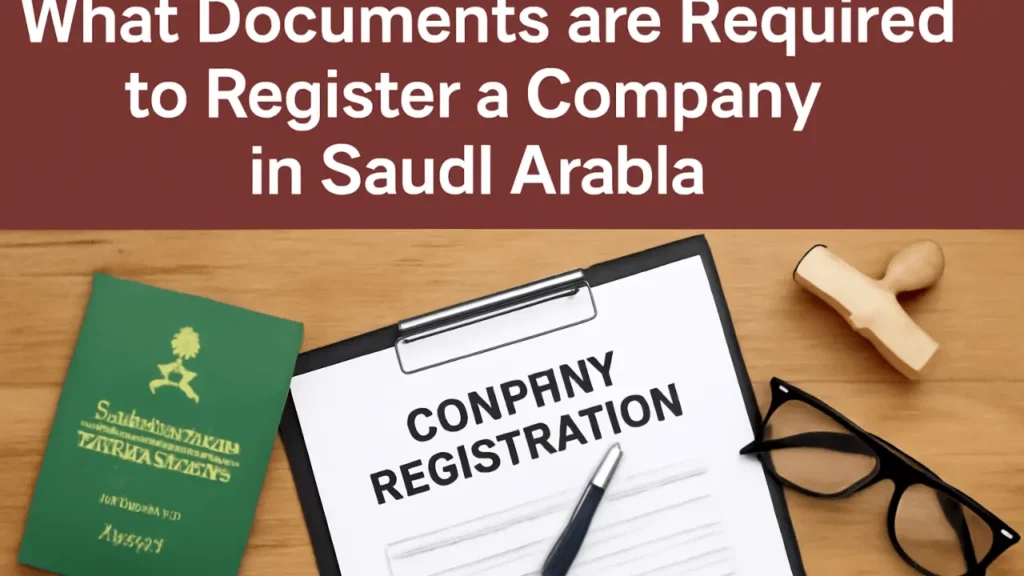Starting a business in Saudi Arabia is an exciting opportunity, thanks to its growing economy, strategic location, and business-friendly policies.
Whether you’re a local entrepreneur or a foreign investor looking to establish a company in Saudi Arabia, understanding the registration process and the documents required to register a company is essential. Ensuring you have the necessary documents will make the process much smoother and ensure your business is legally compliant.
The company registration process in Saudi Arabia is structured and requires specific paperwork to be submitted to key authorities, such as the Ministry of Commerce and Investment (MCI) and the Saudi Arabian General Investment Authority (SAGIA). From registering a Limited Liability Company (LLC) to obtaining commercial registration (CR), knowing the necessary documents will help avoid delays in your business setup process.
In this comprehensive guide, we will break down the required documents to register a company in Saudi Arabia. Whether you’re registering as a foreign investor or a local business owner, this article will ensure you’re fully informed and prepared for the registration process.
1. Understanding the Business Registration Process in Saudi Arabia
The business registration process in Saudi Arabia is essential to legally operate in the Kingdom. It takes a few key steps—from picking the right type of company to getting all the licenses you need to start operating smoothly.
Saudi Arabia offers multiple business structures, such as Limited Liability Companies (LLCs), Joint Stock Companies (JSCs), and foreign branch offices. Each structure has unique documentation requirements.
If you’re a foreign investor, your first move is getting a Saudi Investment License (SIL) through SAGIA—it’s your ticket to starting business in the Kingdom.
This license is crucial for foreign businesses to establish a presence in Saudi Arabia with 100% ownership. After securing the SIL, the next step is to apply for a commercial registration (CR).
The CR is required to legally start operating your business in the Kingdom.
The registration process in Saudi Arabia also includes reserving your company name, drafting your Memorandum of Association (MoA), and submitting key documents such as identification of founders, proof of capital, and details of your business activities.
Whether you’re starting a local LLC or setting up a foreign company branch, having the proper documents will expedite the process and ensure compliance.
2. Required Documents for Company Registration
When it comes to registering a company in Saudi Arabia, there are several important documents you need to submit to the relevant authorities.
These documents vary depending on the company structure, but all businesses need to comply with the requirements set by the Ministry of Commerce and Investment (MCI) and other government agencies.
Legal Structure Documentation:
Choosing the right company structure is the first step. Whether you’re registering an LLC, a Joint Stock Company (JSC), or a foreign branch, the legal structure will determine the specific documents required.
For instance, an LLC requires a minimum capital deposit, while JSCs might require additional financial documents.
Commercial Registration (CR) Documents:
To legally operate your business in Saudi Arabia, obtaining a Commercial Registration (CR) is essential.
The documents for the CR include company name reservation, a copy of the Memorandum of Association (MoA), details of the company’s shareholders, and business activities.
The CR is necessary for all businesses, regardless of their type.
Founders’ Identification Documents:
All shareholders whether local or foreign must provide valid identification documents.
This includes passports for foreign shareholders, national IDs for Saudi nationals, and proof of residence such as utility bills or rental agreements.
These documents are required to verify the identity and legitimacy of the company’s founders.
Proof of Capital:
An essential part of the registration process is proving that your company has sufficient capital.
This can be demonstrated by providing a bank statement or deposit receipt showing the minimum capital required for your chosen business structure.
This document is required by authorities to ensure the financial stability of the company.
3. Saudi Investment License (for Foreign Investors)
For foreign investors in Saudi Arabia, obtaining a Saudi Investment License (SIL) from the Saudi Arabian General Investment Authority (SAGIA) is mandatory.
The SIL allows foreign businesses to operate in the Kingdom with full ownership, which is a significant advantage for international entrepreneurs.
The application process for the Saudi Investment License involves submitting a detailed business plan that outlines the scope of operations, market analysis, and how the business will contribute to the Saudi economy.
Job creation for Saudi nationals, technology transfer, and local development must be addressed in the business plan to meet SAGIA’s requirements.
In addition to the business plan, foreign investors must provide personal identification documents, including passports and proof of financial standing to demonstrate they have the necessary capital to support the business.
In some cases, technical qualifications or other professional certifications may also be required, depending on the nature of the business.
Once the SAGIA Investment License is obtained, foreign investors can proceed with registering for Commercial Registration (CR) and officially establish their business in Saudi Arabia.
The Investment License is what makes it possible for foreign-owned businesses to legally operate in Saudi Arabia—it’s a crucial part of getting started.
4. Professional Licenses (if applicable)
Certain businesses in Saudi Arabia, particularly those in regulated industries such as healthcare, construction, finance, and food services, require additional professional licenses.
These licenses are necessary to ensure that businesses comply with specific industry standards and regulations set by relevant Saudi authorities.
For example, businesses in the healthcare sector must obtain a license from the Saudi Ministry of Health (MOH). Similarly, food and beverage businesses need to secure approval from the Saudi Food and Drug Authority (SFDA), while construction companies require certification from the Saudi Arabian Engineers Association (SAEA).
Obtaining these professional licenses involves submitting industry-specific documents such as certifications, safety plans, and compliance documentation.
For instance, a construction business must provide proof of technical qualifications and demonstrate adherence to Saudi safety standards.
Similarly, a financial services business will need to submit compliance documents for approval from the Saudi Arabian Monetary Authority (SAMA).
Having the required professional licenses is crucial for businesses operating in regulated industries. Without them, businesses will not be able to legally operate in Saudi Arabia, which can lead to delays or even cancellation of the business registration.
5. Tax Registration Documents
Once your business is registered in Saudi Arabia, the next step is to register for taxes with the General Authority of Zakat and Tax (GAZT). This process is essential for businesses involved in sales, imports, and services.
Documents Needed for Tax Registration:
- Commercial Registration (CR): Proof of your business’s legal registration.
- Memorandum of Association (MoA): The company’s foundational document outlining its structure and purpose.
- Identification Documents: Copies of passports for foreign shareholders and national IDs for Saudi founders.
- Business Activity Details: Documentation that specifies your business activities to determine VAT applicability.
Why Tax Registration is Important:
- Registering with GAZT ensures compliance with Saudi Arabia’s tax laws.
- VAT registration is required for businesses with taxable activities.
- Tax Identification Number (TIN) is essential for conducting business transactions and submitting tax returns.
Failure to register for taxes or to meet tax deadlines can result in penalties, so it’s crucial to complete tax registration on time. After registering, your business will need to submit VAT returns and other tax-related filings regularly.
6. Saudi Arabian Chamber of Commerce Membership
All businesses in Saudi Arabia are required to join the Chamber of Commerce. This membership is essential for networking and engaging with other businesses, and it’s a requirement for accessing various government services and programs.
Documents Needed for Chamber of Commerce Membership:
- Commercial Registration (CR): Proof that your business is legally established in Saudi Arabia.
- Investment License: For foreign investors, a copy of the Saudi Investment License from SAGIA.
- Payment Receipt: Proof of payment for the membership fee.
Benefits of Chamber of Commerce Membership:
- Networking Opportunities: Access to business forums and events.
- Business Directory: Inclusion in a business directory, enhancing visibility and credibility.
- Government Procurement Programs: Eligibility for government projects and procurement processes.
By becoming a member of the Chamber of Commerce, your business can leverage these opportunities to grow and expand in Saudi Arabia.
7. Other Documents for Specific Business Types
Certain sectors in Saudi Arabia require additional documents to meet industry-specific regulations. If your business falls into a regulated industry, such as real estate, healthcare, or food services, you may need to submit additional documentation.
Examples of Industry-Specific Documents:
- Real Estate: Proof of land ownership or a real estate development license from the Ministry of Housing.
- Healthcare: Approval from the Ministry of Health (MOH) for healthcare businesses like clinics and pharmacies.
- Food Services: Compliance documents from the Saudi Food and Drug Authority (SFDA).
- Construction: Proof of technical qualifications and safety plans to meet Saudi safety standards.
Businesses in sectors such as finance, manufacturing, and education also require additional compliance documentation. Failing to submit the necessary documents for your industry can cause delays or even result in the cancellation of your business registration.
Make sure to research the specific requirements for your business sector before starting the registration process to ensure you have all necessary documents.
8. Post-Registration Documents
After completing the registration process, there are several additional steps to finalize your company’s setup in Saudi Arabia. These steps ensure your business remains compliant with local laws and regulations.
Key Post-Registration Steps:
- VAT Number Registration: If your business is involved in VAT-taxable activities, you need to apply for a VAT registration with the General Authority of Zakat and Tax (GAZT).
- Employee Registration with GOSI: Register your employees with the General Organization for Social Insurance (GOSI) to ensure compliance with social insurance requirements.
- Saudization Program Compliance: Foreign businesses are required to hire a certain percentage of Saudi nationals to comply with the Saudization program.
Ongoing Compliance Requirements:
- Annual Tax Returns: Businesses must file annual VAT returns and submit financial audits.
- Employee Reporting: Businesses must maintain accurate records of employees and ensure compliance with GOSI regulations.
By completing these post-registration steps and maintaining compliance, your business will be well-positioned for success in Saudi Arabia.
Conclusion
Registering a company in Saudi Arabia requires several essential documents and compliance with local regulations. From obtaining the Saudi Investment License (SIL) for foreign investors to secure Commercial Registration (CR) and registering for tax purposes, each step is crucial to establishing a legally recognized business.
Key Documents for Company Registration:
- Commercial Registration (CR)
- Saudi Investment License (SIL) (for foreign investors)
- Memorandum of Association (MoA)
- Proof of Capital
- Industry-Specific Licenses (if applicable)
Completing the registration process ensures your business is ready to operate in Saudi Arabia. By understanding the necessary paperwork, you can avoid delays, reduce costs, and ensure your company remains compliant with local laws.
If you need further assistance, consider consulting with a business setup consultant in Saudi Arabia to guide you through the registration process. Properly preparing all required documents will help you get your business up and running quickly and efficiently.
Local City Solutions – your trusted partner for company registration and business setup in Saudi Arabia.


